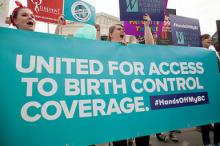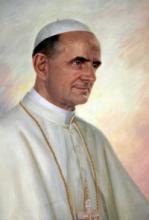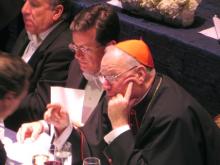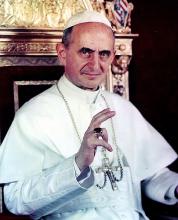Humanae Vitae

She later remarked, “It just struck me as ridiculous….How could they be talking about marriage and birth control of all things without a lot more input from the persons involved?” Crowley testified before the commission, telling them that, besides being unreliable, rhythm was psychologically harmful, did not foster married love or unity and, moreover, was unnatural.

As he wraps up a Vatican meeting marked by sharp debates over sex and morality, Pope Francis on Oct. 19 will honor one of his most controversial predecessors by beatifying Pope Paul VI, who is most famous for reaffirming the Catholic Church’s ban on artificial contraception.
Beatification puts Paul one step shy of formal sainthood. The move might seem out of step with Francis’ pastoral approach given that Paul’s birth control ruling, in the 1968 encyclical “Humanae Vitae,” set the stage for the culture wars that overtook Catholicism after Paul died in 1978.
A wide swath of Catholics, especially in the U.S. and Europe, were furious over Paul’s decision. They were convinced that the ban would be lifted and that Paul was shutting down the reforms that had begun a few years earlier with momentous changes adopted by the Second Vatican Council.
Many conservatives, on the other hand, hailed “Humanae Vitae” for reasserting traditional doctrine, and the division foreshadowed the deep splits that have played out even in this month’s high-level synod in Rome — a polarization that Francis says he wants to overcome.
Yet Francis is trying to accomplish that goal by focusing not so much on “Humanae Vitae” but on Paul VI’s many other groundbreaking, though often overlooked, contributions:

It’s almost a year since Pope Francis was chosen as Benedict XVI’s successor. The Argentinian-born pontiff has quickly achieved global fame for his numerous statements indicating that significant changes may be coming to the Roman Catholic Church.
One possible change emerged last month when London’s Sunday Times reported that Francis wants to make public the Vatican’s archives of Pius XII’s pontificate. Eugenio Pacelli became pope in 1939 and served as pontiff during the period of World War II and the Holocaust until his death in 1958.
According to the British newspaper, Francis wants to release the Pius XII papers for study before determining whether to consider his controversial predecessor for sainthood. Francis has already “fast-tracked” the path to sainthood for John XXIII and John Paul II, but not Pius XII.

The great and the good — and lots of politicians and TV pundits, too — gathered Thursday to hear comedian Stephen Colbert roast and toast everyone from Pope Francis to his host for the evening, Cardinal Timothy Dolan.
The 68th annual Al Smith Dinner, named for the first Catholic presidential candidate in American history, at the Waldorf Astoria hotel raised $3 million for New York’s neediest children.
Colbert is a lifelong Catholic, a man who is, as Alfred E. Smith IV said in introducing him, “serious about both his craft and his Catholic faith.” The cardinal — who is also pretty funny — and the comedian first met last fall, and Colbert had Dolan on his show last month. So the archbishop of New York returned the favor by having Colbert headline the dinner.

The president's plan meant that religious employers — mainly Catholic universities, hospitals and social service agencies — would not be involved in paying for or administering something they deem sinful: contraception. At the same time, all employees would still have access to the same contraception benefit, no matter whom they work for.
Critics of the president's plan, however, didn't see it that way.
"Dangerous and insulting," a group of leading Catholic bishops wrote to their fellow churchmen. "A cheap accounting trick," Robert P. George, Mary Ann Glendon and several other leading culture warriors complained in an open letter that has generated more than 100 signers.
The "compromise," said New York Times columnist Ross Douthat, "asks the parties involved to compromise their reasoning faculties and play a game of 'let's pretend' instead."
Yet that "game," as Douthat put it, is actually a venerable tradition in Catholic moral theology that for centuries has provided a way for Christians to think about acting virtuously in a fallen world.

Editor's Note: The following aritcle was written in 2008, around the 40th anniversary of Humanae Vitae, the papal document that reinforced the Catholic Church's ban on artificial birth control.
Some say Pope Paul VI predicted the dangers of loosening sexual morals: widespread divorce, disease and promiscuity. Others say he cracked open a culture of dissent that has seeped into every corner of the church.
Either way, more than 40 years after Paul VI released ``Humanae Vitae'' on July 25, 1968, the papal encylical banning most forms of birth control continues to be a flashpoint in the Catholic Church.
Earlier this year, Cardinal Francis George of Chicago said Humanae Vitae set up ``a direct conflict between many people's experience ... and the authority of the church.''